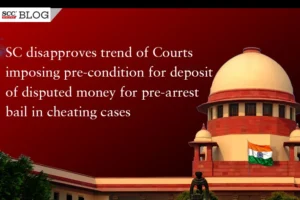Supreme Court: The bench of S. Ravindra Bhat and Dipankar Datta, JJ has disapproved the trend of Courts imposing conditions for deposit or payment of disputed money as a requirement for granting pre-arrest bail in Cheating cases and has observed that,
“Inclusion of a condition for payment of money by the applicant for bail tends to create an impression that bail could be secured by depositing money alleged to have been cheated. That is really not the purpose and intent of the provisions for grant of bail.”
The Court’s opinion came after it noticed the disquieting trend that in multiple cases in the past several months that upon First Information Reports being lodged inter alia under section 420 IPC, judicial proceedings initiated by persons, accused of cheating, to obtain orders under Section 438 CrPC, 1973 are unwittingly being transformed into processes for recovery of the quantum of money allegedly cheated and the courts driven to impose conditions for deposit/payment as pre-requisite for grant of pre-arrest bail.
The Court, hence, considered appropriate to remind the High Courts and the Sessions Courts not to be unduly swayed by submissions advanced by counsel on behalf of the accused in the nature of undertakings to keep in deposit/repay any amount while seeking bail under section 438 of the Cr. PC. and incorporating a condition in that behalf for deposit/payment as a pre-requisite for grant of bail.
The Court noted that Sub-section (2) of section 438 of the Cr. PC does empower the high court or the court of sessions to impose such conditions while making a direction under sub-section (1) as it may think fit in the light of the facts of the particular case and such direction may include the conditions as in clauses (i) to (iv) thereof. However, the conditions to be imposed must not be onerous or unreasonable or excessive. In the context of grant of bail, all such conditions that would facilitate the appearance of the accused before the investigating officer/court, unhindered completion of investigation/trial and safety of the community assume relevance.
It was, however, made clear that the Court was not laying down the law that in no case should willingness to make payment/deposit by the accused be considered before grant of an order for bail. It explained that in exceptional cases such as where an allegation of misappropriation of public money by the accused is levelled and the accused while seeking indulgence of the court to have his liberty secured/restored volunteers to account for the whole or any part of the public money allegedly misappropriated by him, it would be open to the concerned court to consider whether in the larger public interest the money misappropriated should be allowed to be deposited before the application for anticipatory bail/bail is taken up for final consideration.
“After all, no court should be averse to putting public money back in the system if the situation is conducive therefor. We are minded to think that this approach would be in the larger interest of the community. However, such an approach would not be warranted in cases of private disputes where private parties complain of their money being involved in the offence of cheating.”
[Ramesh Kumar v. State of NCT of Delhi, 2023 SCC OnLine SC 766, decided on 04-07-2023]
Judgment authored by Justice Dipankar Datta
Advocates who appeared in this case :
For Petitioner: Adv. ER Sumathy

